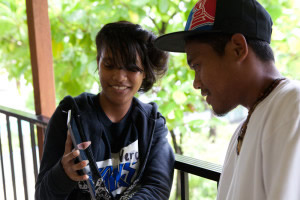International Workshops
International Youth Leadership Workshops (2014-16)
The Nuclear Futures Partnership Initiative is working with the Global Hibakusha Project to facilitate three international youth leadership workshops, held annually, for representatives from Japan, Marshall Islands, Australia, and Kazakhstan. The creative focus is using digital media to enhance youth leadership skills. The overall aim of the workshops will be to build resilience and use creative expression to enhance empowerment and reconciliation. The artworks created will be multi-media and multi-platform – photography, short videos, music, painting, sculpture, and digital art that can be exhibited locally, uploaded online and/or toured with the Nuclear Futures showcases.
The first workshop took place in the Marshall Islands to commemorate the 60 year anniversary of the Bravo test; the second workshop in Hiroshima coincided with the 70 year anniversary of the bombings of Hiroshima and Nagasaki, and the third plans to commemorate the commencement of Britain’s series of testing at Maralinga in the South Australian desert. Cultural exchange between representatives from Yalata and Japanese hibakusha in particular have proved to be rich and rewarding.
Key Partners: Global Hibakusha Project, Murdoch University, Atomic Photographers Guild, Japan Society for the Promotion of Science.
Key Artists: Bo Jacobs and Mick Broderick (Facilitators), Linda Dement (digital artist), Jessie Boylan (Photographer); Amitesh Grover (Live streaming).
Global Hibakusha Project
Positioned from within the Hiroshima Peace Institute (see below) at Hiroshima City University, the Global Hibakusha Project is an international outreach initiative engaging with radiation-exposed communities located near nuclear sites, such as atmospheric weapons testing, manufacturing or power plant accidents. ‘Hibakusha’ refers to the surviving victims and communities of the Hiroshima and Nagasaki bombings and is now used more broadly to describe atomic survivor communities worldwide. The key aims of the Global Hibakusha Project are to support the establishment of intercommunity connections, while enhancing community integrity and building hibakusha community resilience.
The Hiroshima Peace Institute was established in 1998, as a research institute affiliated with Hiroshima City University. Located in Hiroshima, the city that experienced the first atomic bombing in human history, the HPI engages in a variety of research activities relating to peace, nuclear holocausts, disarmament, and the related international politics.
